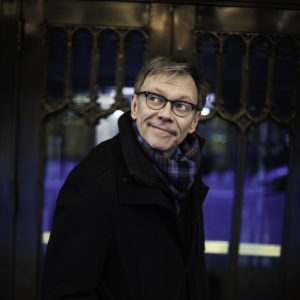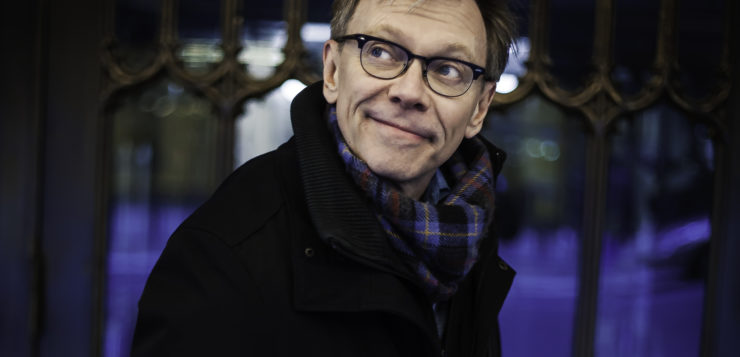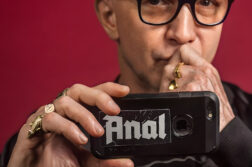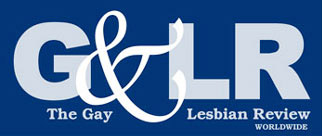 I MET David Dean Bottrell in 2006, shortly after I moved to Los Angeles. I’d seen the OutFest screening of a short film called “Available Men,” which he’d written and directed. He didn’t know at the time that his career was about to take off (again). Now, a dozen years later, he’s been almost famous for a decade; he’s been all over your TV set, performed onstage, and taught acting classes. In February, his memoir, Working Actor: Breaking In, Making a Living, and Making a Life in the Fabulous Trenches of Show Business, will be published by Ten Speed Press/Random House.
I MET David Dean Bottrell in 2006, shortly after I moved to Los Angeles. I’d seen the OutFest screening of a short film called “Available Men,” which he’d written and directed. He didn’t know at the time that his career was about to take off (again). Now, a dozen years later, he’s been almost famous for a decade; he’s been all over your TV set, performed onstage, and taught acting classes. In February, his memoir, Working Actor: Breaking In, Making a Living, and Making a Life in the Fabulous Trenches of Show Business, will be published by Ten Speed Press/Random House.
I was able to read David’s book in manuscript, and we had a freewheeling conversation about all things DDB in December.
Chris Freeman: David, can you take me back to that short film? It really was the beginning of the “big” phase in your career.
David Dean Bottrell: Although I started out as an actor, I’d been working in the screenwriting business for a few years. I was lucky in that I was getting steadily hired to write screenplays for big studios, but not many of them were getting made into films. In fact, in the thirteen years I worked in that industry, only one film, Kingdom Come, got made. So many of the projects got mired in studio politics, it just felt increasingly insane. I started getting really frustrated.
The next thing I knew, I was having this whirlwind affair with a handsome attorney. I blinked twice and found myself living with him in D.C. while commuting to L.A. for work. It was sort of glamorous until I discovered he’d been masterfully concealing a very big drug problem from me. My romance crashed; I returned to L.A. and fell into a deep depression. Then, one morning, standing at my kitchen sink, I came up with an idea for a fifteen-minute short movie called “Available Men.” The concept, a gay “mistaken identity/blind date” comedy, actually made me laugh out loud. I went up to my office and wrote it in ten hours. Thirty days later, I shot it on a song and a prayer. Ninety days after that, we screened it. It went on to win “Best Short Film” at the two biggest LGBT film festivals: OutFest in L.A. and NewFest in New York. It went on to win awards in fifteen more festivals around the world, including the HBO Comedy Festival. It totally reinvigorated my writing career and my life.
CF: You talk in the memoir about your big break, a recurring role on Boston Legal. That role really put you on the map. What else can you say about that—when it was happening and in the aftermath?
DDB: One day, my phone rang, and it was the casting director of Boston Legal asking me to come in and read for a small guest star role. I was stunned that she even remembered me. It had been over a decade since I quit acting to focus on writing. I politely declined, but she refused to take no for an answer. The character was described as a “Truman Capote” type. Though I don’t do impersonations, I decided to go into the audition and try to channel the mannerisms of this very bizarre guy that I’d known in New York when I was a young man. He used to hire me to bartend his parties, which I was always happy to do since he a good tipper. And he was utterly insane. He was about as gay as a human being could be, but refused to admit it. He was always talking about dating these fictional women.
Fortunately for me, David E. Kelley, the creator of the show, saw my taped audition, thought I was hilarious, and kept bringing the character back for a big chunk of the season. So, after not having acted for years, I was in these big juicy scenes with amazing actors like James Spader, Candice Bergen, William Shatner, and Julie Bowen. People were stopping me in the street for autographs. Other shows started calling to see if I was available, and suddenly I was an actor again.
CF: Most of your career—all of it?—you’ve been out as a gay actor. In the thirty-plus years in the business, how have attitudes changed? Where did homophobia reside in your experience?
DDB: I came out shortly after I left acting school. I don’t remember it as a conscious decision. It just sort of happened gradually as I began to work. I was also lucky to have discovered my niche very early in my career. I was always at my best when I was playing a character that clearly had something wrong with them. Those characters rarely ever had girlfriends (or boyfriends, or any kind of love life), so I never had to worry much about hiding who I was.
The screenwriting business was a little different. It was ridiculously competitive, and there was a lot of testosterone fueling pretty much every decision. Fortunately, the movies I wrote were mostly smaller budget, character-based films, so I wasn’t dealing much with ultra-macho directors or producers. My scripts were smart and funny and, as long as the actors were happy, nobody cared who wrote them. I will say that in the olden times, the prevailing notion was that if you were openly gay and wanted to stay steadily employed, you had to make sure that the heterosexuals in the room weren’t uncomfortable, so a lot of us did stupid things like cross our legs at the ankle instead of the knee and try not to wave our hands around a lot while talking. That all seems really laughable to me now. Some of the most successful creatives in television and film are openly gay.
CF: In your book, you talk about a lot about the psychology of acting. Did you know that before “the closet” the operative metaphor was “the mask”? You were a queer kid growing up in Kentucky; does the mask image resonate for you?
DDB: Speaking as the son of a small-town Evangelical minister, I can say I put my mask on pretty early. When I look at photos of myself as a kid, I feel bad for that little boy. It’s rough when you realize your favorite toys are the ones that belong to your sister, but the only time you can play with them is when no one is around. My mask stayed on until my college girlfriend discovered I was having an affair with another guy. That was a rough patch for me (and for my ex-girlfriend and for my family), but it was also like that moment it in The Wizard of Oz when the world is transformed from black and white to color. I fell in love with a sweet boy with a hairy chest. And I fell in love with my life.
CF: At one point in the memoir you declare, “I was going to be me—not Sean Penn.” That realization was a huge turning point for you, no?
DDB: Yes, that moment was huge for me as both an artist and a gay human being. A few years ago, I started teaching. It’s been a remarkable experience, and I’ve truly loved it. One of the things I try to stress with young actors is the importance of taking whatever you perceive as a flaw—whatever you are secretly uncomfortable with—your height, your weight, your nose, your hair, your skin, your background—and remind yourself daily that “flaws” are your greatest assets. Being an actor means transforming ourselves, but it doesn’t mean hiding who we truly are. Our humanity, our pain, our faults, our courage are all part of the essential clay out of which we’re going to fashion some kind of art. Until you know who you are (and are okay with that), it’s hard to create anything good.
CF: Your book is primarily for actors, but I found it highly relatable for me as a teacher. I especially like what you say near the end: “I wrote this book so I could cheer all of you on from the sidelines.”
DDB: It’s funny. My copy editor said she really enjoyed the book because it spoke to her experience as a freelancer. Who knows? Maybe it will find an unexpected audience. I have discovered over time that ambition and accomplishment will only get me so far. If I’m only interested in myself and my desires, if I’m always avoiding the inconvenience created by other people, I’m missing some of the best stuff life has to offer. I’m currently in a truly wonderful relationship with a terrific man. What makes it great is that both parties seem to understand that the word “care” should always be a verb. We’re living through a great chapter together. My students have also taught me a lot. It true, when you give, you receive.
CF: Finally, you write about where you find yourself now in a very level-headed and inspiring way. What more can you say about where you find yourself now?
DDB: Show business is constantly producing shiny objects that appear to be just out of reach. It never ends. Although I didn’t always feel this way, I now feel lucky to have been born gay in Kentucky. It forced me to educate myself and develop life skills like humor, curiosity, courage, and compassion—all of which made me a better artist and a better man. Whatever cards you’ve been dealt in this life, I believe discovering and using your creative impulses are the surest way to heal yourself. The most famous and successful people I know have said to me, “I’m grateful for what happened, but I didn’t get what I wanted.” I had no idea what that meant when I was a young man, but I sure understand it now. You can plot and plan all you want, but in the end, all you have is today, so you’d best carpe the hell out of that diem and try to be proud of your efforts. It’s important to absorb what’s going on around you and then contribute something new to that. To live fully is the greatest accomplishment there is.
Chris Freeman teaches at UCLA. His next book,Isherwood in Transit, is forthcoming from the University of Minnesota Press.






